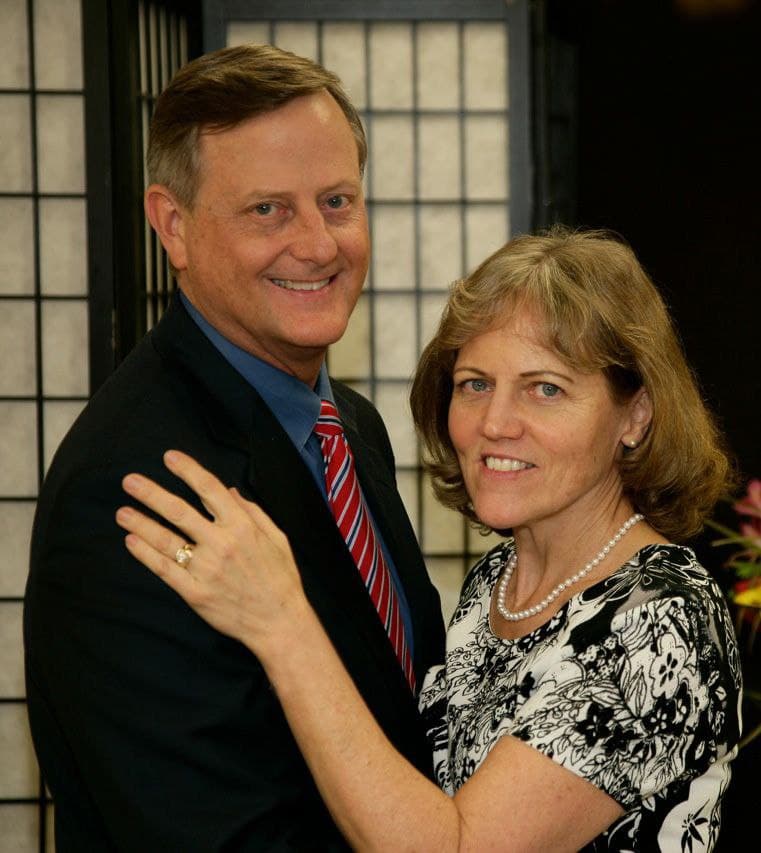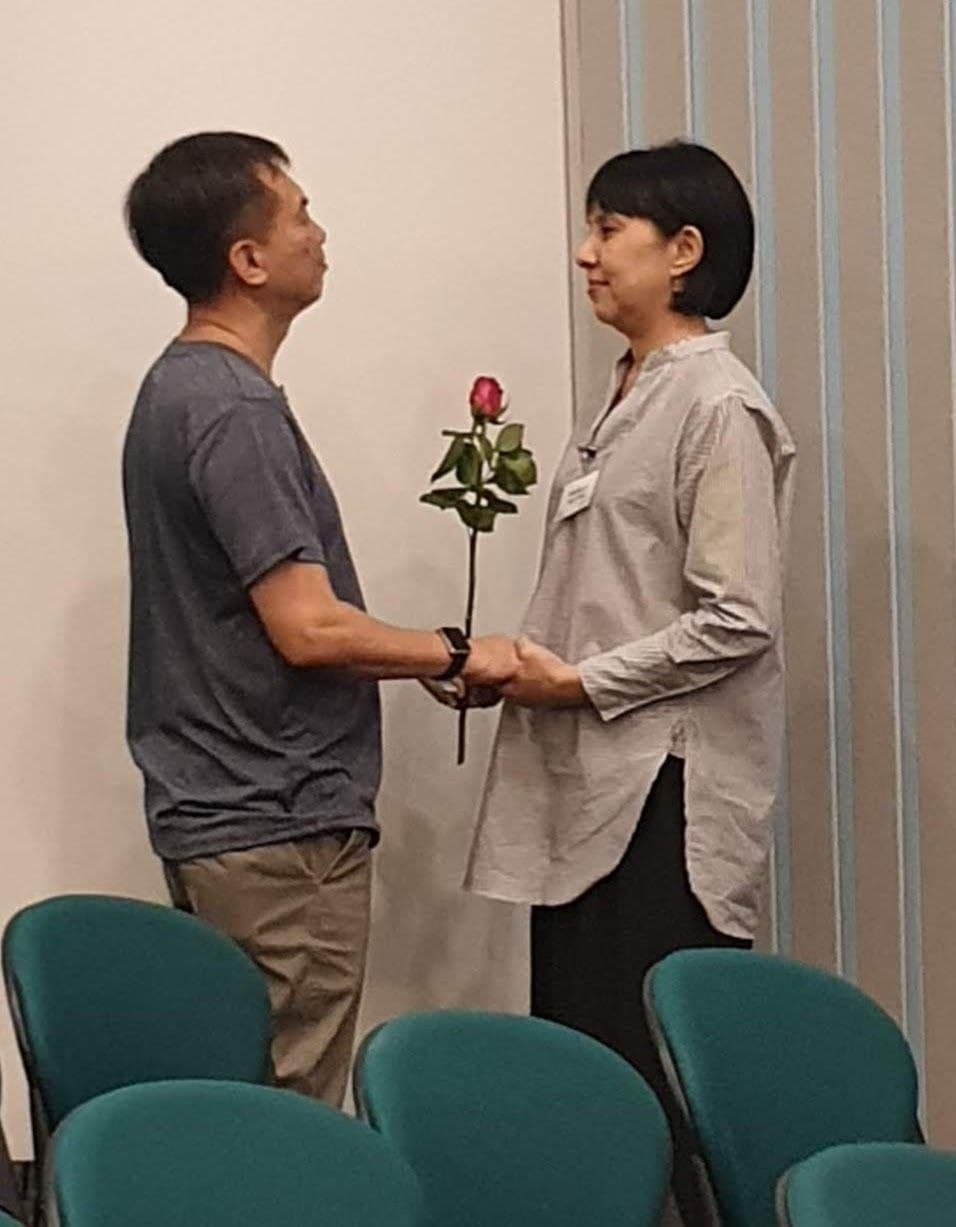Strategies on conflict resolution that saved my marriage: Pastor Craig Hill
by Janice Tai // December 8, 2021, 10:40 pm

Pastor Craig Hill and his wife Janice shared frankly that they had daily conflicts in their marriage for seven years. Since then Ps Craig has trained Family Foundations ministry teams in more than 50 nations around the world and, together with Janice, he conducts over 2,500 marriage and family blessing weekend experiences each year. Here's what turned their marriage around. Photos by Alison Lim.
Would you have imagined that the founder of an international Christian ministry for families and marriage once endured seven years of daily conflict in his own marriage?
Pastor Craig Hill, founder of Family Foundations International, and his wife are both Christians who love the Lord and each other. They have a common purpose.
Yet all these anchors were not sufficient to prevent their marriage from almost being torn apart.
Often frustrated with each other, Pastor Hill’s wife, Janice, could be critical and Pastor Hill reacted by defending and justifying himself.
Over time, they found themselves keeping their distance from each other and settling for barely any romance in their marriage.
But that, thankfully, was not the end of their story.

Despite being Christians who both loved the Lord and each other, these anchors were not sufficient to prevent the Hills’ marriage from almost being torn apart until they learnt how to communicate love and respect to each other.
“God met us right where we were and we discovered keys that radically changed our relationship and transformed the way we treated each other on a daily basis. They helped us find joy in our marriage once again,” said Ps Craig to an online audience of couples, some newly married while others married for decades with marital battle scars to show for it.
He was speaking at a Marriage Breakthrough Encounter conference held for couples in Singapore earlier this month. The conference sought to empower couples to receive breakthroughs in their marriage, particularly in the areas of communication, covenant, forgiveness and conflict resolution.
“God met us right where we were and we discovered keys that radically changed our relationship.”
A classic example of how couples often unintentionally wound or hurt one another, said Ps Craig, can be seen when a husband returns home late from work and his wife asks him: “Why did you come home so late?”
“You know what most husbands do? The computer in their brain turns on and scans for ‘Reasons why I’m late’. He would explain to her that he was about to leave the office when an important client called. So, he had to get some files out of the file cabinet, scan them and send them to him. Having left later than usual, he encountered more traffic on the roads. He was also running out of petrol so he went to the fuel station. He would likely conclude by saying he got home as soon as he could.
“Is his wife satisfied? No,” said Ps Craig.
In this situation, the husband would feel unjustly accused: Surely, he needed to pay attention to the important client. What does she want me to do? Quit my job?
The lawyer in us
“In a conflict, one person usually feels devalued while the other person feels falsely accused. So, the devalued person has a prosecuting attorney that makes a case that the other person is hurting me and he doesn’t care. The other person has a defence attorney who is going to defend his case and so both lawyers rise up and fight with each other.
“The very first thing to do is to fire the lawyer in us,” he said.
Instead of engaging our inner lawyer, what would be more useful is for both spouses to know the difference between level one and level two communication, he added.
Level one communication is topical communication, revolving around surface level details of daily topics. Level two is relational communication that entails the deeper messages pertaining to identity and value.
Ps Craig said that, though the wife was asking a level one question – “Why did you come home so late?” – it would be useful for the husband to understand that she was looking for a level two answer instead of a level one response (listing various factors that delayed him).
“The very first thing to do is to fire the lawyer in us.”
“If your defence lawyer rises up, and you tell her five reasons why you are late, you will destroy your marriage. That’s because you’re sending a message on level two: I don’t care about you. I care about me. I’m going to defend, justify and explain myself,” said Pastor Craig.
“It never works because her real level two question is not ‘Why were you late’. Your wife only has one real question. And she asks it over and over and over again, though the presenting questions that she asks may sound different,” he said.
“That question is: Do you love me?”
What is likely on the wife’s mind when she asks him why he is so late is: “You made me feel like everything and everybody else is higher priority to you. Your job is more important. Your money is more important. Your friends are more important. Everything you do and your agenda is more important. I mean nothing to you and that hurts me and makes me feel worthless and unloved.”
What is happening here is that the husband is draining her “value” tank of love by coming home late, and further emptying it when he tries to defend himself instead of acknowledging the feelings she is harbouring.
It is common wisdom, and also seen in Scripture in Ephesians 5:33, that a wife craves love while a husband craves respect to fuel their respective “value” tanks.
Resolving conflict: Tips for husbands
Ps Craig encourages men to learn to shift a conversation from level one to level two communication.
Here are five questions and steps that husbands can use to resolve relational conflicts:
- “By the tone of your voice, I sense that I have hurt you. Is that true?”
- “Please share with me: How did I make you feel?”
- “At that time, I didn’t realise I made you feel that way, but now I realise that’s exactly what I did. I am so sorry. Will you please forgive me?”
- Ask for forgiveness for the specific ways you made her feel unloved, uncared for or not listened to.
- “I love you and the last thing that I would ever want to do is to hurt you, or make you feel like I don’t love you or care about you.”
“If you are sincere about it, she will know,” said Ps Craig. “The matter is resolved quickly and you can have a nice evening.”
These questions work because they fulfil the various aspects of love that women desire. From his interviews with many wives, Ps Craig discovered that love generally means three things to a woman:
1) You make me feel like I am of a high priority in your life.
2) You understand and care about my feelings.
3) You take responsibility when you hurt me and apologise.
“You don’t have to be wrong to apologise. The husband might actually be right on level one communication, for example, coming home late because of the client wasn’t wrong. But he still wounded his wife,” said Ps Craig.

A couple at the Covenant Marriage Retreat in Faith Methodist Church in 2018 conducted by Pastor Craig Hill and Janice.
Just as love is essential for a wife to thrive, so respect is needed to fuel husbands’ value tanks, he emphasised.
“Most wives have little understanding of what respect means to a husband. If you went to him and said, ‘Honey, I respect you so much’, that does absolutely nothing,” said Ps Craig.
Respect means three things to men, he found.
1) Acceptance: You make me feel accepted and pleasing in your sight.
2) Appreciation: You thank me for my work and my efforts to please and help you.
3) Admiration: You tell me good things about my work and the roles I have played as a husband, boss or father.
“What’s the opposite of respect? Rejection. Not respecting your husband means criticising him, telling him all the things which are wrong with him and all the things he needs to change. It’s not a mystery that he’s going to close up and withdraw,” said Ps Craig.
The common dynamic of criticism and defensiveness between spouses ends up draining each other’s value tank.
He noted that many wives are in idolatry because they have taken God’s place in presuming that it is their job to try to change their husbands when it is God’s.
Said Ps Craig: “The deepest desire of my heart is to hear these words from my wife: Good job. I’m happy with you. I’m pleased with you. The thing that hurts me more than anything else is when I get a level two message from my wife that says: You’re a failure. You’re not what I need. You’re not what I want. What kind of a husband are you?
“That’s deeply painful, and that’ll cause me to close up.”
Whenever wives tell him that their husbands talk to everyone and anyone except to them, Ps Craig said: “I know that’s a wife who does not admire or appreciate the husband. Why? Because admiration and appreciation always open a man’s heart and he will be drawn towards her. Criticism, rejection and efforts to try to change him will close him up and he will move far away from her into his own world.”
Resolving conflict: Tips for wives
The dynamic of criticism and defensiveness that commonly operates between many husbands and wives unintentionally ends up draining each other’s value tank.
Ps Craig’s own marriage was not exempt.
“It was painful. For seven years, Jan criticised me and told me all the things that were wrong and how I should change. All she was doing was draining my value tank and making me feel like an invalid husband and worthless. That made me defensive and made me want to argue with her,” he shared candidly.
“Your true enemy is not your spouse. The battle is against Satan who uses specific strategies to set you up to battle against each other.”
He, on the other hand, hurt her by unwittingly making her feel she was of low priority in his life.
“When she would try to talk to me, I would invalidate her feelings and reject her and make her feel stupid. I never took responsibility for wounding her on level two because I never saw it. I was so focussed on level one and thinking that I was right. So, I never apologised or took responsibility for hurting her by asking for forgiveness,” he added.
Over time, they stopped being around each other because it was not a pleasant experience to keep wounding and hurting each other. They thought their marriage was doomed. But then they learnt to ask each other questions instead.
Just as husbands can ask questions to resolve relational conflicts, so wives can ask these questions:
1) “I sense that I have made you feel like you are not acceptable in my sight and I don’t appreciate your efforts. Is that true?”
2) “Please share with me: How did I make you feel?”
3) “At that time, I didn’t realise I made you feel falsely accused and unappreciated, but now I can see that’s exactly what I did. I am so sorry. Will you forgive me?”
4) Ask for forgiveness for the specific ways you have made him feel criticised, rejected, accused or unappreciated.
5) “Thank you so much for all you do for me and our family. You are an awesome husband.” (Thank him for the specific things he has done to love and care for you.)

Pastor Craig Hill and his wife Janice conducting a Covenant Marriage Retreat for couples at Faith Methodist Church in 2018.
Today, Ps Craig and Janice have been married over 38 years and have two married sons and three grandchildren. Their marriage is stronger than ever; Ps Craig has since trained Family Foundations ministry teams in more than 50 nations around the world and together they conduct over 2,500 marriage and family blessing weekend experiences each year.
Said Ps Craig: “Your true enemy is not your wife or your husband. The battle is against Satan who uses specific strategies to set you up to battle against each other. May these insights about marriage disarm such strategies.”
RELATED STORIES:
What they never knew about marriage and each other till they tied the knot
We are an independent, non-profit organisation that relies on the generosity of our readers, such as yourself, to continue serving the kingdom. Every dollar donated goes directly back into our editorial coverage.
Would you consider partnering with us in our kingdom work by supporting us financially, either as a one-off donation, or a recurring pledge?
Support Salt&Light



